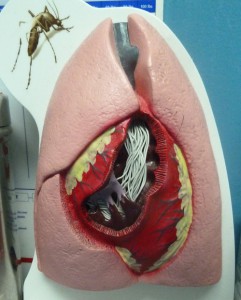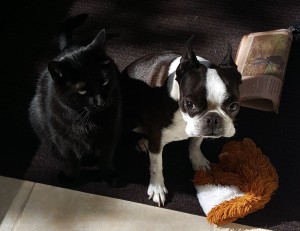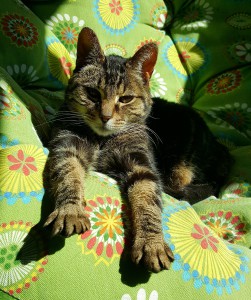As our kittys age, physical and mental changes occur just as they do with people. Their metabolism may change, they sleep more deeply and may not be able to jump as high as they once did when they were younger. This being said, cats should be seen more often than once a year (recommendation is every 6 months) as they begin to age, usually around the age of 7 years of age.
It is always easier to treat a disease if caught early on and cats often do a great job at hiding some of these changes. They may often be subtle changes that we chalk up to slowing down due to age but these changes could also be due to a medical issue. Read the rest of this entry »
Senior Dog & Cat Tips
Senior Feline Health Issues
July 25th, 2018 by Laurie BrushImportance of Heartworm Preventative
April 20th, 2018 by Laurie BrushHeartworm Disease is a potentially life threatening condition caused by parasitic worms that can live in the heart and lungs of dogs and cats. It is important to prevent heartworm disease versus waiting for your pet to contract it as it can be difficult and costly to treat. The treatment requires a series of treatments over several months.

How do pets get heartworm disease?
Mosquitoes. When a mosquito bites an infected pet, it sucks blood containing microfilariae. (Microfilariae are the offspring of the adult heartworm). Once matured inside the mosquito, the offspring develop into infective larvae. This infective larvae are passed on when the mosquito bites another pet.
How to protect your pet?
Giving your pet a monthly preventative is key. Most heartworm preventatives also protect your pet from other intestinal parasites and fleas. Due to unpredictable seasons it is recommended to keep your pet on heartworm preventative year round.
A blood test is recommended to confirm that your pet is free of heartworm disease before prescribing heartworm preventative as many heartworm preventatives can cause illness if given with larvae in the bloodstream. Contact your pets veterinarian for their recommendations.
*For more specific information regarding heartworm disease and recommendations, go to https://www.heartwormsociety.org/pet-owner-resources
Should my other pets be present
February 26th, 2018 by Laurie Brush“Should my other pets be present during the euthanasia process?” is a common question we get.
The answer is definitely yes, if at all possible. Allowing other pets in the household to be present during euthanasia or giving them a chance to say goodbye after the pet has passed away often gives a sense of closure. This will also decrease the chance that the pet will be waiting at the door or look all over the house for their deceased friend to come back home. We want to lessen the chance of them becoming depressed, looking out the windows, or even going off their food during the grieving process.
We here at Heaven at Home encourage other pets to be present throughout the procedure if possible. Occasionally a young, hyper or anxious pet may be too distracting to be participate initially and in this case we encourage owners to have them in a different room. But often, even these personality types settle after becoming acquainted with the doctor and will have a “sense” of what is happening with their friend. Most times once we have begun, they lay down a small distance or even right next to their friend and accompany them as they cross over the rainbow bridge.
initially and in this case we encourage owners to have them in a different room. But often, even these personality types settle after becoming acquainted with the doctor and will have a “sense” of what is happening with their friend. Most times once we have begun, they lay down a small distance or even right next to their friend and accompany them as they cross over the rainbow bridge.
If for some reason it is impossible for other pets to be present during the procedure, they should at least have the chance to say good bye once the pet has passed. In most cases, the process does not take long, usually a brief sniff or glance before walking away. They often just seem to “know.” This does not mean that they won’t continue to grieve and may still look for their friend but it tends to help give a smoother transition. They will need extra love and support during the next few days as well.
At-Home Pet Euthanasia: Ways to Say Goodbye
June 14th, 2017 by Laurie Brush Heaven at Home Pet Hospice knows there’s no easy way to say goodbye to your loyal fur-family member. However, through helping hundreds of Grand Rapids and West Michigan pet owners provide peaceful passings, Dr. Laurie Brush feels there’s therapeutic value to celebrating the life of your pet during a euthanasia home visit.
Heaven at Home Pet Hospice knows there’s no easy way to say goodbye to your loyal fur-family member. However, through helping hundreds of Grand Rapids and West Michigan pet owners provide peaceful passings, Dr. Laurie Brush feels there’s therapeutic value to celebrating the life of your pet during a euthanasia home visit.
“Death is hard to talk about,” Dr. Brush says. “But it doesn’t need to be fraught with struggle. This might be the worst day of your life, but it doesn’t have to be the worst day of your fur-baby’s life. On the contrary, we can help your pet pass comfortably with dignity and compassion.”
By performing home euthanasia for companion animals, Dr. Brush’s goal is to prevent animals from experiencing the stress, and sometimes fear, of trips to the vet when unwell. Read the rest of this entry »
Pain Management for Arthritis in Dogs and Cats
May 2nd, 2017 by Laurie Brush One of the toughest things our West Michigan dog and cat owners encounter is dealing with that scourge of aging pets, arthritis. In making her palliative care rounds, pet hospice veterinarian Dr. Laurie Brush hears stories of how the once sunny and agile ‘Bessie the Boxer’ can no longer play ball or manage the stairs. Tommy the Tabby cat won’t allow a cuddle. And Lucy the Lab is absolutely miserable with her hip dysplasia.
One of the toughest things our West Michigan dog and cat owners encounter is dealing with that scourge of aging pets, arthritis. In making her palliative care rounds, pet hospice veterinarian Dr. Laurie Brush hears stories of how the once sunny and agile ‘Bessie the Boxer’ can no longer play ball or manage the stairs. Tommy the Tabby cat won’t allow a cuddle. And Lucy the Lab is absolutely miserable with her hip dysplasia.
The culprit is arthritic pain, and if your dog or cat is dealing with it, they can transform from playful pals into crotchety companions.
“Clients may see a personality change. Their pet may become aggressive, or not interact the way they used to,” Dr. Brush explains. “Our treatment goal is to reduce suffering in ways that will not compromise the animal’s overall health. This requires what is known as multi-modal pain management.” Read the rest of this entry »
Senior Pet Tips: Managing Incontinence in Senior Dogs & Cats
March 1st, 2017 by Laurie Brush As pet home hospice veterinarians, we regularly help pet owners in Grand Rapids and West Michigan care for aging and terminally ill dogs and cats to keep these loyal companions comfortable during their final stages of life. One of the more common problems we face with these pets is incontinence.
As pet home hospice veterinarians, we regularly help pet owners in Grand Rapids and West Michigan care for aging and terminally ill dogs and cats to keep these loyal companions comfortable during their final stages of life. One of the more common problems we face with these pets is incontinence.
There are a number of reasons why your canine companion or feline friend has become incontinent with advanced age or illness, ranging from changing hormones, spinal or nerve issues, infections or a particular illness, increased stress, or simply aging. Though a licensed veterinarian should be the one to make a formal diagnosis, below we’ve listed some of the common causes of incontinence in dogs and cats and potential steps to mitigate the problem. Read the rest of this entry »
Pet Connections: Loss & Love
March 4th, 2016 by Laurie BrushWe know how difficult it is to lose a pet. Whether you recently lost a pet or are grieving a pet lost some time ago, here is an opportunity to share your story with others. Next Tuesday, March 8, right here in Grand Rapids. Share this flyer if you know someone who has lost a special pet.


